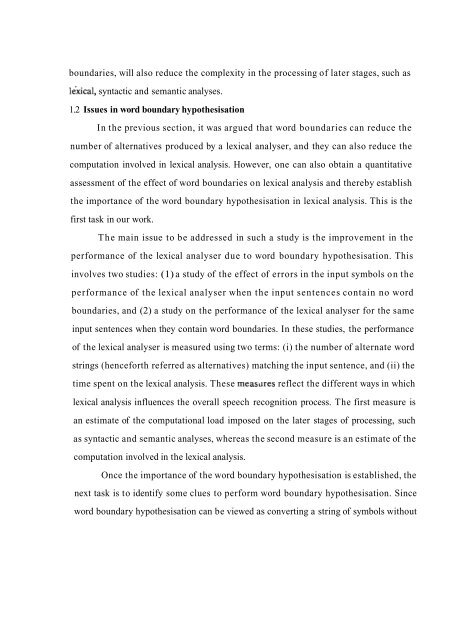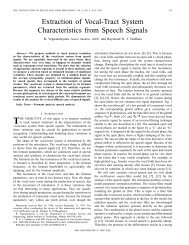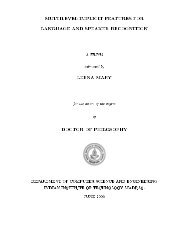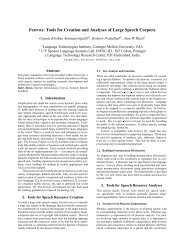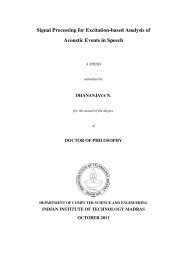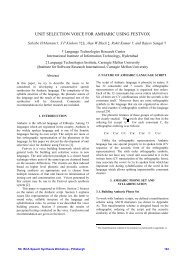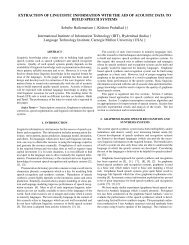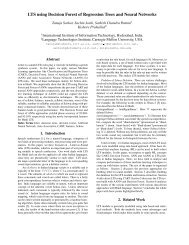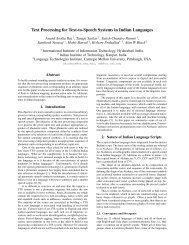word boundary- hypothesisation in hindi speech - Speech and ...
word boundary- hypothesisation in hindi speech - Speech and ...
word boundary- hypothesisation in hindi speech - Speech and ...
Create successful ePaper yourself
Turn your PDF publications into a flip-book with our unique Google optimized e-Paper software.
oundaries, will also reduce the complexity <strong>in</strong> the process<strong>in</strong>g of later stages, such as<br />
lekcal, syntactic <strong>and</strong> semantic analyses.<br />
1.2 Issues <strong>in</strong> <strong>word</strong> <strong>boundary</strong> <strong>hypothesisation</strong><br />
In the previous section, it was argued that <strong>word</strong> boundaries can reduce the<br />
number of alternatives produced by a lexical analyser, <strong>and</strong> they can also reduce the<br />
computation <strong>in</strong>volved <strong>in</strong> lexical analysis. However, one can also obta<strong>in</strong> a quantitative<br />
assessment of the effect of <strong>word</strong> boundaries on lexical analysis <strong>and</strong> thereby establish<br />
the importance of the <strong>word</strong> <strong>boundary</strong> <strong>hypothesisation</strong> <strong>in</strong> lexical analysis. This is the<br />
first task <strong>in</strong> our work.<br />
The ma<strong>in</strong> issue to be addressed <strong>in</strong> such a study is the improvement <strong>in</strong> the<br />
performance of the lexical analyser due to <strong>word</strong> <strong>boundary</strong> <strong>hypothesisation</strong>. This<br />
<strong>in</strong>volves two studies: (1) a study of the effect of errors <strong>in</strong> the <strong>in</strong>put symbols on the<br />
performance of the lexical analyser when the <strong>in</strong>put sentences conta<strong>in</strong> no <strong>word</strong><br />
boundaries, <strong>and</strong> (2) a study on the performance of the lexical analyser for the same<br />
<strong>in</strong>put sentences when they conta<strong>in</strong> <strong>word</strong> boundaries. In these studies, the performance<br />
of the lexical analyser is measured us<strong>in</strong>g two terms: (i) the number of alternate <strong>word</strong><br />
str<strong>in</strong>gs (henceforth referred as alternatives) match<strong>in</strong>g the <strong>in</strong>put sentence, <strong>and</strong> (ii) the<br />
time spent on the lexical analysis. These meas-dres reflect the different ways <strong>in</strong> which<br />
lexical analysis <strong>in</strong>fluences the overall <strong>speech</strong> recognition process. The first measure is<br />
an estimate of the computational load imposed on the later stages of process<strong>in</strong>g, such<br />
as syntactic <strong>and</strong> semantic analyses, whereas the second measure is an estimate of the<br />
computation <strong>in</strong>volved <strong>in</strong> the lexical analysis.<br />
Once the importance of the <strong>word</strong> <strong>boundary</strong> <strong>hypothesisation</strong> is established, the<br />
next task is to identify some clues to perform <strong>word</strong> <strong>boundary</strong> <strong>hypothesisation</strong>. S<strong>in</strong>ce<br />
<strong>word</strong> <strong>boundary</strong> <strong>hypothesisation</strong> can be viewed as convert<strong>in</strong>g a str<strong>in</strong>g of symbols without


